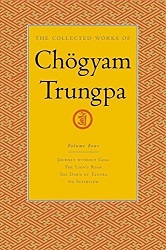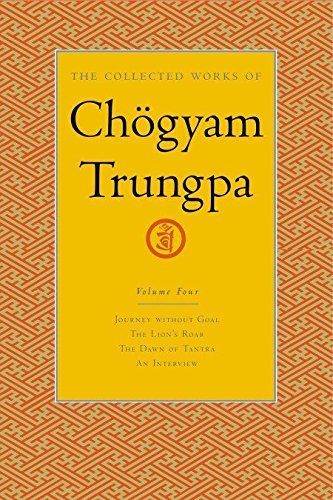
The Collected Works of Chogyam Trungpa – VOL 4
‘Maha Ati’
***
CRAZY WISDOM
Using the word CRAZY from the English language to describe Trantric experience is very tricky because of the various ideas we have about craziness.
In the American Indian tradition there was a warrior named Crazy Horse. He was a crazy, old, wise eccentric, who was a great warrior and had tremendous courage. Being crazy is also associated with the idea of being absurd, on the verge of lunacy. There is also a notion of craziness as being unconventional.
And sometimes we talk about somebody being crazy about music or crazy about honey or sugar. We mean that somebody takes excessive pleasure in something or has an excessive fascination, to the point where he might destroy himself by being so crazy about whatever it is.
We might also say that someone is crazy if he doesn’t agree with us. For instance, if we are trying to form a business, we will approach somebody to be our business partner who agrees with our business proposals. We tell him that the two of us can make lots of money. And if we approach this “uncrazy” person properly, he will accept our logic and he will love the idea of going into business with us. Whereas if we approach an intelligent “crazy” person, he will see through us. He will see any holes in our plan or any neurosis that our business might create. So we don’t want to approach such a person as a business partner: “I won’t talk to him. He’s crazy.” What we mean is, “He will see through me. He won’t buy my simplistic logic, my trip.” That description of craziness comes somewhat close to the tantric idea of craziness. Still, such craziness has a sense of basic ground. There is a lot of room, a lot of trust, but there is also a lot of solidity.
We might also view our grandparents’ orthodoxy as crazy. They are so soaked in their own culture and their own norms that they don’t understand our culture at all. Their crazy ways make them practically unapproachable to us. We cannot shake their faith and their convictions, and we feel frustrated when we have something to say to them and they don’t respond as we want. So we might regard them as semi-crazy.
I don’t think crazy wisdom fits any of the examples above. Instead crazy wisdom is the basic norm or the basic logic of sanity. It is a transparent view that cuts through conventional norms or conventional emotionalism. It is the notion of relating properly with the world. It is knowing how much heat is needed to boil water to make a cup of tea. or how much pressure you should apply to educate your students. That level of craziness is very wise. It is based on being absolutely wise, knowing exactly what to do. Such a wise person is well-versed in the ways of the world, and he has developed and understood basic logic. He knows how to build a campfire, how to pitch a tent, and how to brush his teeth. He knows how to handle himself in relating with the world, from the level of knowing how to make a good fire in the fireplace up to knowing die fine points of philosophy. So there is absolute knowledgeability. And then, on top of that, craziness begins to descend, as an ornament to the basic wisdom that is already there.
In other words, crazy wisdom does not occur unless there is a basic understanding of things, a knowledge of how things function as they are. There has to be a trust in the normal functioning of karmic cause and effect. Having been highly and completely trained, then there is enormous room for crazy wisdom. According to that logic, wisdom does not exactly go crazy; but on top of the basic logic or basic norm, craziness as higher sanity, higher power, or higher magic, can exist.
One attribute of crazy wisdom is fearlessness. Having already understood the logic of how things work, fearlessness is the further power and energy to do what needs to be done, to destroy what needs to be destroyed, to nurse what should be nursed, to encourage what should be encouraged, or whatever the appropriate action is.
The fearlessness of crazy wisdom is also connected with bluntness. 3luntness here is the notion of openness. It is a sense of improvising, being resourceful, but not in the sense of constantly trying to improvise the nature of the world. There are two approaches to improvising. If we have a convenient accident and we capitalize on that, we improvise as we go along. That is the conventional sense of the word. For instance, we might become a famous comedian, not because of our perceptive- cess, but purely because we make funny mistakes. We say the wrong things at the wrong time and people find us hilarious. Therefore we become a famous comedian. That is approaching things from the back door, or more accurately, it is like hanging out in the backyard.
The other approach to improvising, or bluntness, is seeing things as they are. We might see humor in things; we might see strength or weakness. In any case, we see what is there quite bluntly. A crazy wisdom person has this sense of improvising. If such a person sees that something needs to be destroyed rather than preserved, he strikes on the spot. Or if something needs to be preserved, although it might be decaying or becoming old hat, he will nurse it very gently.
So crazy wisdom is absolute perceptiveness, with fearlessness and bluntness. Fundamentally, it is being wise, but not holding to particular doctrines or disciplines or formats. There aren’t any books to follow. Rather, there is endless spontaneity taking place. There is room for being blunt, room for being open. That openness is created by the environment itself. In fact, at the level of crazy wisdom, all activity is created rr the environment. The crazy wisdom person is just an activator, just ore of the conditions that have evolved in the environment.
Since we are reaching the end of our tantric journey together, so to speak, I would like to say something about how you could relate to all of this information that you have received. You don’t have to try to catch the universe in the same way that you would try to catch a grasshopper or a flea. You don’t have to do something with what you have experienced, particularly. Why don’t you let it be as it is? In fact, that might be necessary. If you actually want to use something, you have to let it be. You cannot drink all the water on earth in order to quench your thirst eternally. You might drink a glass of water, but you have to leave the rest of the water, rivers, and oceans so that if you are thirsty again, you can drink more. You have to leave some room somewhere. You don’t have to gulp everything down. It’s much nicer not to do that; in fact it is polite.
If you are terribly hungry and thirsty, you want to attack the universe as your prey all at once: “I’ll have it for my dinner or my breakfast I don’t care.” You don’t think about anybody else who might have rase a humble request, who might just want to have a sip from your glass of milk or a piece of meat from your plate. If you are told that you should be devotional, you might think that means that you should be even more hungry and try to get every possible blessing into your system. Since you are hungry, you suck up everything, all the systems and all the resources that exist, including your own. You don’t find yourself bears a productive human being; instead, you find yourself becoming a monster.
There are a lot of problems with that, unless you have the umbrella of maha ati, which says: “It’s okay. Everything is okay. Just take a pinch of salt, a spoonful of soy sauce. Just take one shot of whiskey. Don’t rush; everything is going to be okay. You can have plenty of room if you want. Just cool it.” You don’t have to do a complete job, all at once. If you go too far, if you are too hungry, you could become a cosmic monster. That message is very courageous, but very few people have the courage to say that.
I am actually concerned and somewhat worried about how you are going to handle all this material. You could overextend yourselves and get completely zonked or completely bewildered. Or you could use this as just another clever reference point, a new vocabulary or logic to manipulate your friends and your world. What you do with this material is really up to you. I hope that you will feel grateful for this introduction to the tantric world, and I hope that you will realize from this that the world is not all that bad and confused. The world can be explored; it is workable, wherever you go, whatever you do. But I would like to plant one basic seed in your mind: I feel that it is absolutely important to make the practice of meditation your source of strength, your source of basic intelligence. Please think about that. You could sit down and do nothing, just sit and do nothing. Stop acting, stop speeding. Sit and do nothing. You should take pride in the fact that you have learned a very valuable message: You actually can survive beautifully by doing nothing.

Chogyam Trungpa Rinpoche
